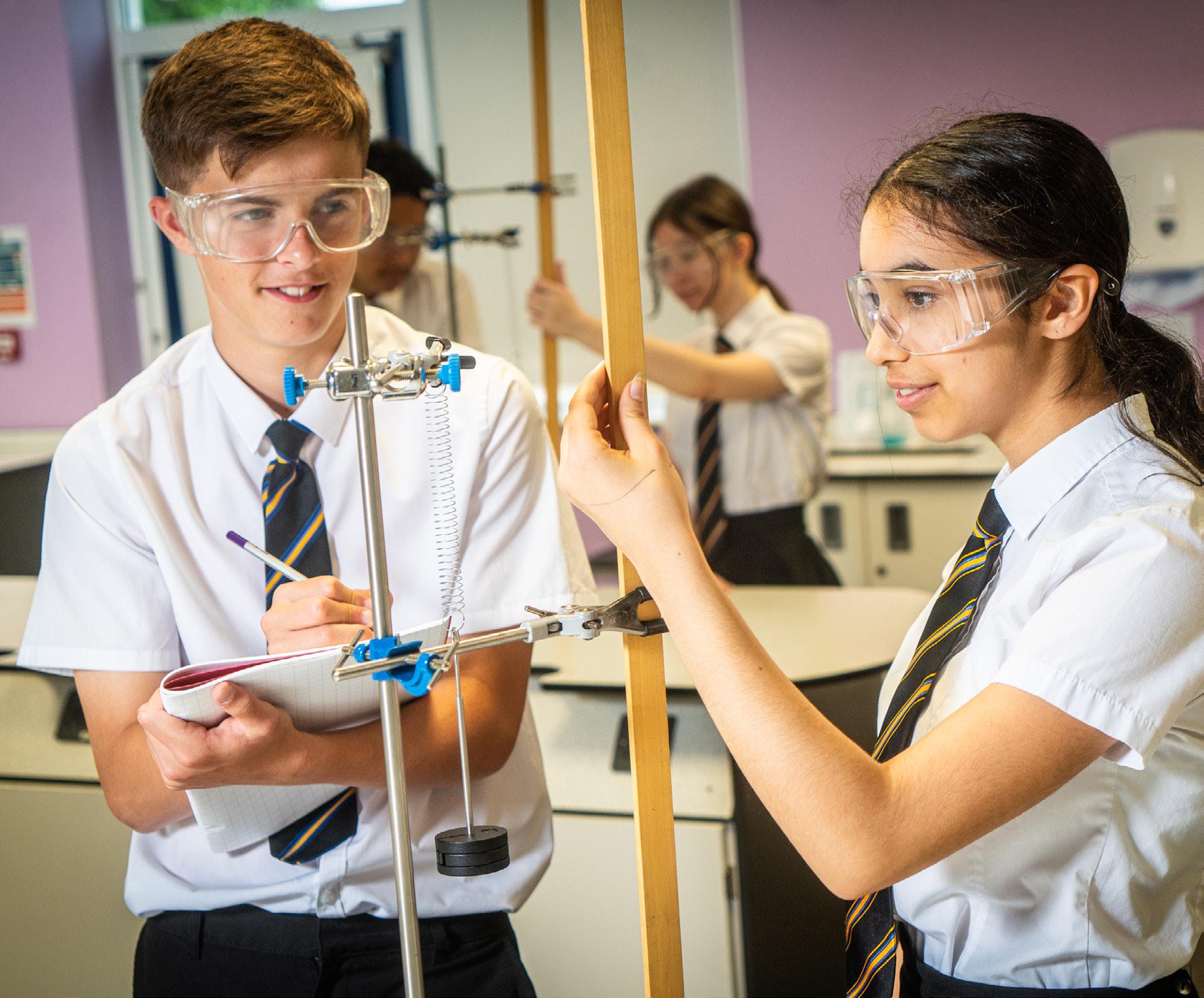

Additional Information For Penwortham Priory Academy
This booklet provides additional information to supplement the main prospectus.
Further information is available about all aspects of the school on our comprehensive website which is kept up to date with news and photographs of events: please visit www.priory.lancs.sch.uk
The
School Day -
Learn to succeed
The school day is designed to uphold our ‘Priory Standard’ and develop our pupils’ value set:
◆ We are Ready to Succeed
◆ We have the right Attitude to Learning to Succeed (By upholding our ‘Attitude to Learning in Lessons Charter’)
◆ We have the right Character (Skills) & Culture (Attitudes) to Succeed
We have an ‘arrival window’ between 8.20am and 8.40am, allowing pupils to come into school and get ready to succeed.
During this arrival window, pupils can come into school, visit their lockers, and get ready for the day ahead.
By 8.40am, they must be in their form room with their form tutor. Staff in this session, will focus not only on the pastoral care of their pupils, but will ensure they are ready to succeed in their learning for the day by checking those elements listed under the first pillar of our ‘Pupil’s Priory Standard’ document.
Registration will be taken promptly at the start of this session at 8.40am and will be taken at the start of every lesson throughout the day to ensure punctuality to all lessons.
Throughout every lesson, pupils will be expected to have the right attitude to learning to succeed, by upholding those elements listed under the second pillar of our ‘Pupil’s Priory Standard’ document and further highlighted in our ‘Attitude to Learning in Lessons Charter’.
Equally, throughout the day, pupils will be expected to demonstrate the right character and culture, by upholding those elements listed under the third pillar of our, ‘Pupil’s Priory Standard’ document.
This includes at break and lunchtime, where pupils are expected to uphold the ‘Priory Standard’ in terms of their behaviour outside of lessons, always.
At the end of the day, pupils go to their Learning for Life lesson taught in their year groups.
This lesson specifically focusses on their personal development, to ensure our pupils have the right character (skills) & culture (attitudes) to succeed, helping them succeed in life, contribute positively to school and society, and go on to further education, employment or training.
This then brings the school day to an end at 3.10pm, except for Year 11, who attend our ‘Study Boost’ sessions.
In addition, throughout each half term, pupils will be involved in full school, house and year group assemblies.
Pupils can purchase meals and snacks to be eaten during our wellbeing breaks, served from their year group dining facility, with eat in or take out options. Pupils are not allowed to leave the premises to purchase food from outside.
The School Day
Arrival Window
House Form Group (Pastoral) (Getting ready to succeed)
Lesson 1 (Academic) (Upholding our ‘Attitude to Learning in Lessons Charter’)
Lesson 2 (Academic) (Upholding our ‘Attitude to Learning in Lessons Charter’)
‘Study Boost’ Break Session
Lesson 3 (Academic) (Upholding our ‘Attitude to Learning in Lessons Charter’)
Lesson 4 (Academic)
(Upholding our ‘Attitude to Learning in Lessons Charter’)
‘Lunch and Learn’ Session (positive reward point) (Time spent in departments, by our pupils, to help them further)
Lesson 5 (Academic)
(Upholding our ‘Attitude to Learning in Lessons Charter’)
Lesson 6 ‘Learning for Life’ lesson (or year group assembly)
(The right character (Skills) & culture (Attitudes) to succeed
Year 11 ‘Study Boost’ Session (positive reward point) (Something we do for our pupils to help them further)

The School Uniform
Penwortham Priory Academy expects the highest standards of its pupils, and uniform and appearance is no exception. Pupils at Priory are extremely proud of their school uniform, knowing when they put on our uniform, they ‘put on our school’ and so wear it with pride. Parents are expected to support our school uniform and appearance policy.
The school believes parents have a duty to send their child to school appropriately dressed and ready to learn. Parents should ensure their child is wearing their uniform correctly and that it is clean. Our staff consistently implement our expected high standards of uniform and appearance.
Certain items of school uniform can only be purchased from our suppliers:
A&D Just
53 Pope Lane, Penwortham, Preston, PR1 9JN.
Smart Clothing
54 Lancaster Road, Preston, PR1 1DD.
Top One Clothing
39 St John’s Shopping Centre, Preston, PR1 1FB.
The full uniform list is shown later in this booklet. All clothes and property must be clearly named.
The appearance of our pupils reflects very much on the school. Parents are asked to support the school to maintain a very high standard of dress by encouraging pupils to be proud to identify themselves with the school and wear the uniform correctly.
In respect of this certain things are not allowed; soft fabric tops commonly referred to as ‘hoodies’, make-up/fake tan/lashes/ false nails/nail varnish and earrings or any other jewellery is not permitted other than a nonsmart watch. Additionally, for very clear health and safety reasons, students are not allowed to wear shoes with a heel nor should they wear soft fabric pumps as school shoes.
With regard to hairstyles, only natural colours are permitted and extreme haircuts will not be tolerated. Pupils are not permitted to have hair shaven below a number 2 cut (grade 2 = 1/4 of an inch or 6mm). The school reserves the right to decide on the appropriateness of a hairstyle or haircut and will apply sanctions as it sees fit, including temporary exclusions from school.
The School Curriculum
At Penwortham Priory Academy the curriculum is designed to recognise children’s prior learning from each key stage, provide challenging learning experiences that require pupils to think hard, allow them to develop leadership and organisational skills and be resilient learners with initiative who have excellent communication skills and are ready to face the challenges beyond school. High quality academic and pastoral guidance enables this and we provide subject choices that support pupils’ learning and progression, and enable them to work towards achieving their goals. The curriculum remains as broad as possible for as long as possible. Pupils study a strong academic core of subjects through the EBacc.
There is a high focus on developing the character and culture of the pupils to be positive, committed individuals willing to evolve, and show kindness and respect to all.
Knowledge is at the heart of our curriculum and underpins our approach because we are all empowered by knowing things and being able to apply what we have learnt in varied and new situations. We put emphasis on the acquisition and use of a broad vocabulary and facilitate this through the reading of fiction and non-fiction texts in various scenarios.
In addition to the diverse and rich opportunities offered through the teaching, we value opportunities to take pupils out on trips and visits to help put the learning into context, expose them to experiences they might not otherwise have and encourage them to learn about the local, national and international communities of which they are a part.
When pupils arrive with us in Year 7, we aim to allocate them to groups with friends from primary school and we do this through a combination of mixed attainment and streamed classes. In Year 9, pupils opt for the suite of subjects that they will start in Year 10. Pupils receive independent advice and guidance to help them make the right choices ensuring that they can follow the higher education, training or employment path of their choice. Beyond Mathematics, English Language and English Literature that all pupils study for GCSE, pupils can also currently opt for:
◆ Chemistry
◆ Biology
◆ Physics
◆ History
◆ Geography
◆ Computer Science
◆ Art and Design
◆ Music
◆ Performing Arts (Acting) (Dance)
◆ French
◆ PE
◆ Astronomy
◆ Food Preparation and Nutrition
◆ Engineering
◆ Graphic Design
◆ Child Development
◆ Further Maths
◆ Business & Enterprise
◆ RE
◆ Sport (Health & Fitness)
◆ Digital Information Technology

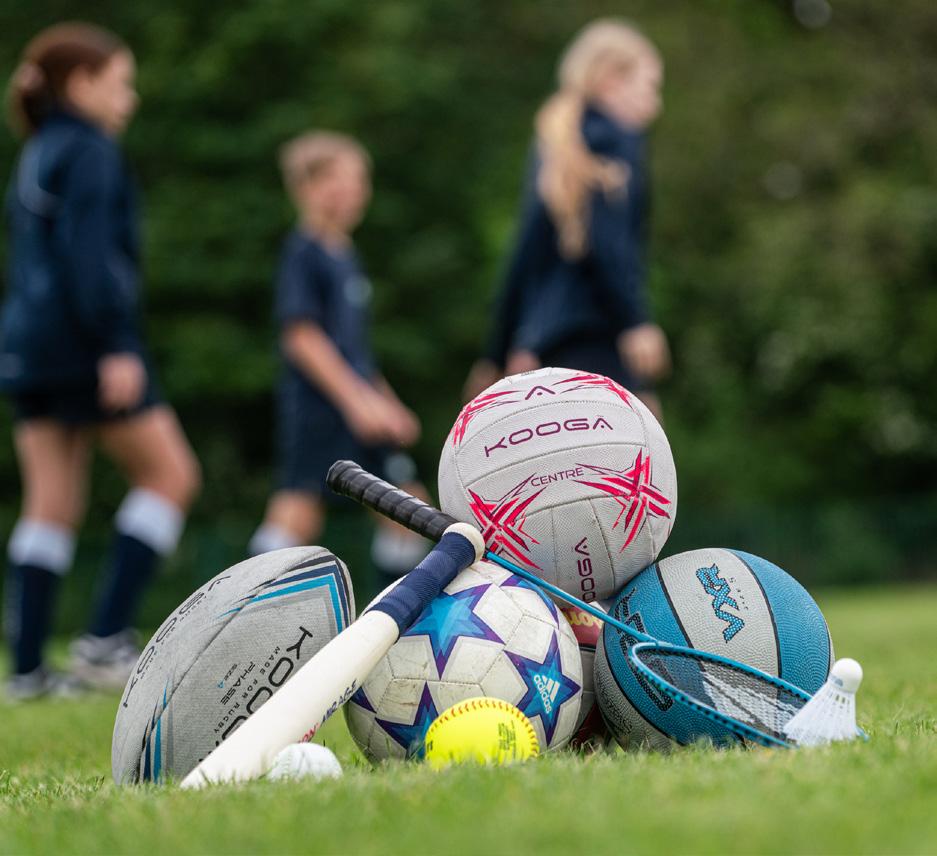

Aside from the lessons, the amount of clubs the school has to offer is incredible.
Ex Pupil

Religious Education
Religious Education is an integral part of a ‘broad and balanced curriculum’. It is open, expansive and allows pupils to explore a range of religious and nonreligious worldviews. Religious Education promotes the spiritual, moral, cultural, mental and physical development of pupils; and prepares pupils at school for the opportunities, responsibilities and experiences of later life.
Religious Education is delivered throughout Year 7-11, in lessons and through faith days and is non-sectarian. Pupils follow courses in six main religions as well as also studying Humanism and non-religious worldviews and exploring their own ideas.
Priory has links with local religious communities and has regular visitors to school.
Pupils who opt for GCSE Religious Education in Year 10 follow the Eduqas A examination route, which enables them to develop their questioning skills, encouraging them to formulate and express their own opinions and ideas as well as encouraging tolerance and an understanding of different religious and non-religious worldviews.
The school links religious ideas and beliefs to current affairs and moral values.
Throughout the subject, pupils are taught the importance of respecting and valuing the cultural differences and beliefs of others.
Parents may exercise their right to withdraw their child from Religious Education lessons.
Carefully tailored support helps pupils to progress through the curriculum successfully.
Ofsted
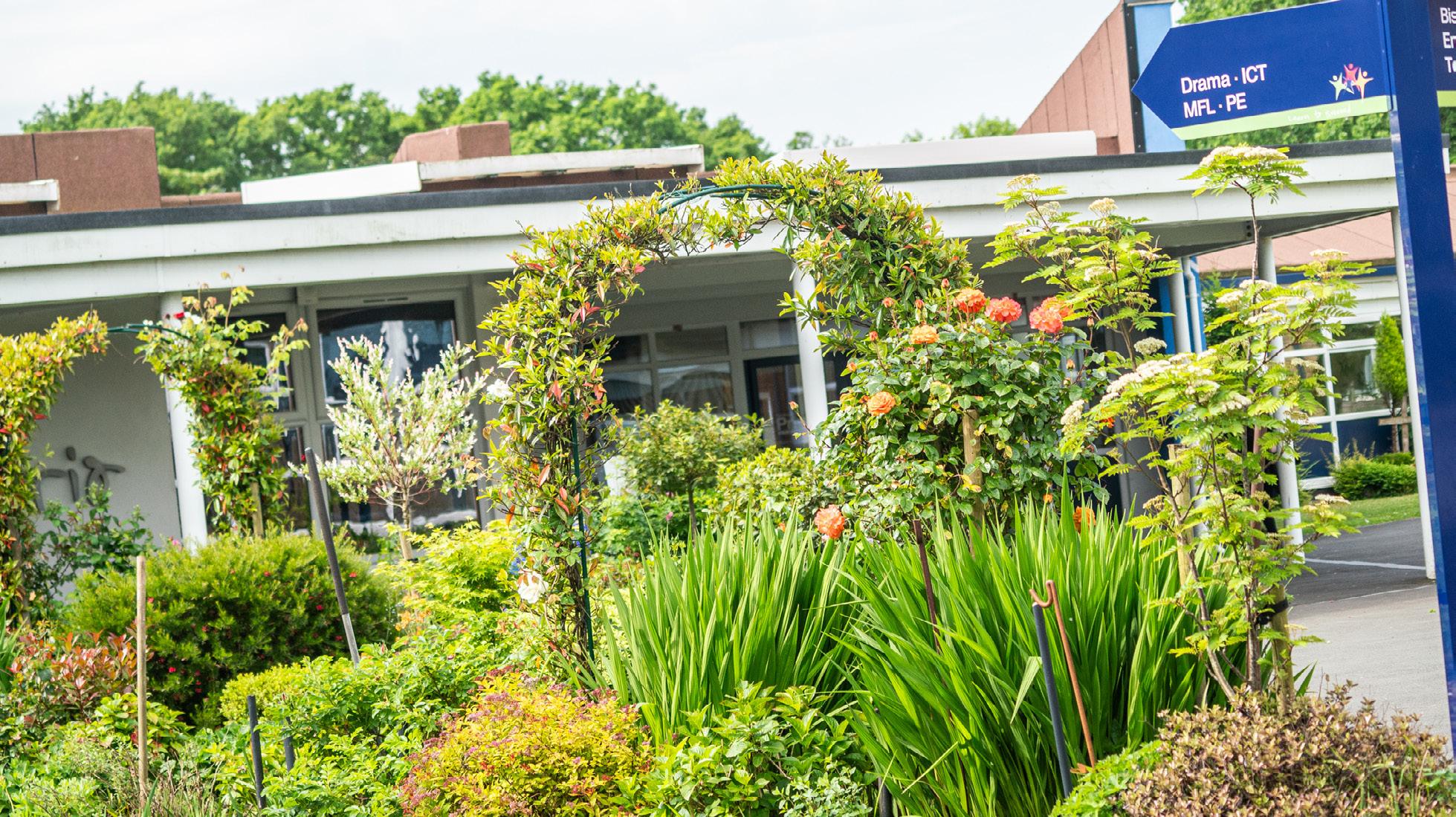
Relationship & Sex Education
The most important source of relationship and sex education is the home and family. It is through normal everyday experiences that children learn the kind of values that lead to happy, fulfilled and lasting relationships in adult life. Penwortham Priory Academy intends that the relationship and sex education policy should support and complement the role of parents.
In the academic year 2020-2021 Health, Relationship and Sex Education became a statutory part of the school curriculum. Penwortham Priory Academy made no change to its current curriculum to accommodate this as the current curriculum had already been taught successfully for a number of years. Statutory requirements state that parents should be consulted regarding content prior to delivery, before new schemes of work are delivered. This process has been adhered to with no objections.
Although aspects of relationships and sex education are implicit in other areas of the curriculum, it is taught specifically in the following areas:
Key Stage 3 PSHE – Learning for Life
◆ Year 7 – Healthy Lifestyles. Self-concept. Medical care. Social Influences
◆ Year 8 – Mind development. Media Literacy and Digital Resilience. Positive Relationships
◆ Year 9 – Diversity and Equality: Gender. Addiction knowledge and impact. Intimate Relationships. Sexual Health. Unhealthy Relationships
Key Stage 4 PSHE – Learning for Life
◆ Year 10 – Pregnancy. Personal Safety ‘Street Life’. Car safety
◆ Year 11 – Health Related Decisions
Key Stage 3 Science
◆ Reproduction
◆ Conception to Birth
Key Stage 4 Science
◆ Responsible Sex – Contraception Methods
Relationship and sex education forms part of a wider programme of personal and social development as preparation for adult life. Personal and social development is given a high priority at Penwortham Priory Academy and is regarded as an integral part of the whole curriculum.
All relationship and sex education is taught within a framework of moral values, encouraging self-respect restraints and respect for others. Where appropriate, team teaching strategies are employed to deliver the programme. Normally the programme is taught within mixed ability and mixed gender groups, although there are times when special provision is made for pupils with special educational needs.
The current materials used by staff for relationship and sex education are available for inspection by parents on request. The Department for Education issues guidelines on programmes of relationship and sex education; these are available to parents.
Parents have the right to withdraw their children from part of the sex education programme, within strict government set regulations, but this must be discussed with the Lead Practitioner for Personal Development and the Principal, following parental review of resources.
The school offers a rich personal, social, health and economic education curriculum. Ofsted
Special Educational Needs, Disabilities & Inclusions
All pupils at Penwortham Priory Academy are equally valued and empowered to voice and affect decisions made, with the right to learn, achieve and participate fully in education by having access to a broad, balanced, relevant and differentiated curriculum.
Some pupils, during the course of their time in an educational setting, may have special educational needs. The school will strive to meet these needs as fully as possible. We aim to create an environment in which pupils’ needs are identified, assessed, met and received in line with the Revised Code of Practice (2014) and more recent government initiatives.
It is our aim to ensure that all pupils have an equal right to realise their potential socially, emotionally, physically and intellectually and have full access to the National Curriculum. We aim to identify as quickly as possible, those children who have special educational needs at either end of the spectrum and to give appropriate support in terms of curriculum planning, support and resources. To meet a child’s needs we recognise the importance of, and encourage, the active involvement and support of parents.
The Special Educational Needs Code of Practice sets out guidance on policies and procedures that must legally be adhered to by the school. Children have special educational needs if they have significantly greater difficulty in learning than the majority of the children of the same age or if they have a disability, which prevents them from making use of educational facilities generally provided for children of the same age.
We aim to be able to address and cater for the needs of any pupils with Special Educational Needs or Disabilities and first choice requests for these students will be given priority. As stated in the Admissions Policy, the Trustees will not automatically refuse to admit a child with previously identified needs unless their needs cannot be met without making unreasonable alterations to the school building or that their inclusion would be incompatible with the education of other children. This is done in line with the School Accessibility Plan (required under the Disability Discrimination Act 1995).
The Trustees continue to be aware of the needs of children with physical disability. When an application is received, staff ensure that children’s needs are met through discussions with relevant outside agencies so that they are placed appropriately and given access to the same opportunities as their peer group. Risk assessments are continually updated to ensure a safe learning environment for all children.
The Special Educational Needs Co-ordinator (SENCo) monitors children on the SEND register very closely and continually reviews Individual Education Plans. Parents are invited to all reviews and given copies of all relevant information.
The Trustees are kept up to date on all SEND issues by the designated Trustee.
At time of going to print, the school’s SEN, Disability and Inclusion Policy had no changes, but will be amended in line with new government guidelines and initiatives as necessary.

I liked Priory for a number of reasons. Firstly, its attitude towards students. The school cares about its students and wants them to achieve their very best.
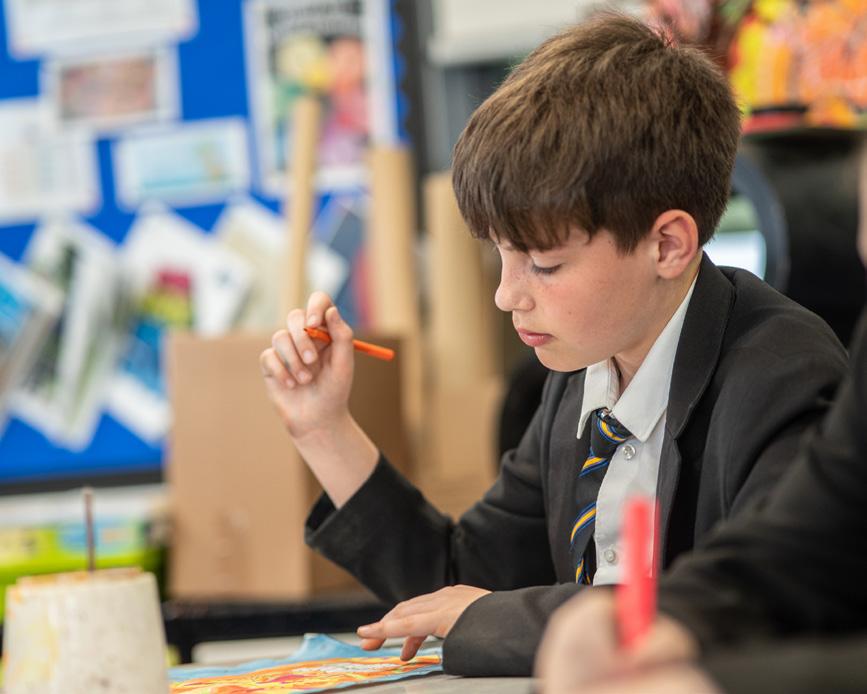
Ex Pupil
Personal Development Award Programme
Our three main awards
The Priory+ Award
Our Priory+ Award scheme aims to encourage pupils to engage in a wide range of other activities, both in and out of school, that contribute further to their own Personal Development, and rewards them for doing so. At Priory we believe that strong Personal Development provision contributes to making a positive difference to pupils’ lives.

The opportunities provided not only allow pupils to engage in activities they are interested in, but enables them to explore and build a strong pathway to, and foundation for, a successful future. Our activities fit into five overarching strands, which supplement our Character and Culture and Personal Development sessions in Learning for Life. There are five strands:
Culture & Heritage:
Growing up in Britain we benefit from learning about a wide range of cultural influences. We have an ability to recognise, and value, the things we all share in common across cultural, religious, ethnic and socio-economic communities. The activities in this strand allow pupils to explore different aspects of culture and heritage which are of personal interest to them. Activities include such things as a visit to a castle or participating in a competition.
Future Citizens:
These activities shape understanding and attitudes towards the importance of community cohesion and how we can truly live together more harmoniously through activities. Pupils are encouraged to participate in volunteering, organising and participating in charity events, in school, at home and in the community. Activities include such things as donating to a food bank or participating in a community event.
Health and Wellbeing:
Pupils will explore aspects of health and wellbeing that interest or impact them and their family. Activities cover themes such as mental and physical wellbeing, food, health, substance misuse, and relationships. Activities include such things as participating in a sport or engaging in mindful activities.
Skill Builders:
Pupils will have the opportunity to develop key life attributes and skills which contribute to character development as well as being desirable by employers. Pupils will discover their own strengths and aptitudes, and inspire and develop themselves as individuals. Experiences gained through these activities can inform CVs, applications, and interviews, particularly to demonstrate use of soft skills. Activities include such things as learning a new craft or developing an employment skill.
Bright Futures:
Preparing pupils for the next stage of their lives and giving them impartial information, advice and guidance, to shape their career path is important, and these activities engage pupils to be proactive in shaping their own futures. Activities include such things as researching careers or practicing writing CVs.
Reward:
Priory+ is rewarded with a star badge, certificates for pupil’s Record of Achievement, and Achievement Points towards trips. On completion of activities, pupils can also receive certificates towards the main PiXL Edge Award at Apprentice level.
Criteria:
Pupils will achieve a star when they: Complete one activity from each of the five strands. One activity must be a co-curricular club/activity/group from the timetable provided.
Note: For further examples of the types of activities pupils can include towards their Priory+ Award, please see our ‘Priory+ Award Activities’ information sheet.
The PiXL Edge

Awarded for demonstrating those skills needed for employability
Whilst studying at Penwortham Priory Academy, pupils will engage in a rewards programme known as ‘PiXL Edge’. The PiXL Edge is a framework to develop and accredit students with those personal attributes essential for employability.
The scheme will focus on five key attributes:
1. Leadership
2. Organisation
3. Initiative
4. Resilience
5. Communication
These attributes have been especially chosen for their formative qualities in character development as well as their desirability by employers. Activities may be completed in class, in school as extracurricular, or in their lives outside school but must be selected from a
The Duke of Edinburgh’s Award

We are proud to offer the Duke of Edinburgh’s Award to all Year 9 pupils at Penwortham Priory Academy. The DofE is the world’s leading youth achievement award, recognised nationally and internationally by colleges, universities, and employers.
We have redesigned our programme to make it accessible to all. Training is now built into the school day through three dedicated dropdown sessions, and pupils can choose the level of participation that suits them best:
1. Priory Outdoor Skills Award
This school-based award focuses on core expedition and life skills. Pupils take part in volunteering activities, map reading, team challenges, and route planning. All pupils attend these training days, and those who complete them receive recognition through our bespoke Priory Outdoor Skills Award.
2. Duke of Edinburgh’s Participation Award
Pupils complete the three core DofE sections — Volunteering, Physical, and Skill — but without undertaking the expedition. Activities can be
regulated PiXL database of over 1000 activities. This is to ensure rigor and consistency.
The database is constantly growing and appeals to students through age-aware topics and creative, engaging projects suggested by educators themselves. Students set their own pace and record their progress using a specially designed secure online platform.
Students may qualify at two levels whilst at Priory
PiXL Master
Pupils have the opportunity during Learning for Life sessions in the afternoon to use school’s PCs and to gain assistance from a PiXL specialist member of staff to complete the award.
For more information visit - www.pixl.org.uk/edge

completed through school clubs, personal hobbies, or community involvement, with support from staff. Pupils track their progress via a DofE online platform and build valuable personal development evidence.
3. Duke of Edinburgh’s Bronze Award
Pupils who complete the three core sections and attend all required training will have the opportunity to take part in a two-day, one-night assessed expedition in the Rivington area, with remote supervision and an overnight stay.
The total cost of taking part in the award, including enrolment and the expedition, will not exceed £100. This includes a £26 fee for the online eDofE account and an expedition fee, both of which are nonrefundable.
Our aim is for as many pupils as possible to complete the full Bronze Award, building confidence, independence, and resilience along the way. Whether pupils complete just the training days or go all the way to the expedition, all will gain important life skills and recognition for their efforts.

PSHE & Citizenship
Personal, Social and Health Education (PSHE)
Personal, Social, Health & Economic Education (PSHE) is a subject in its own right. Pupils learn about an array of risky behaviours which they may experience in life, how to avoid risk, and signposting to help for the future. They learn how to function positively in families and society, whilst identifying negative behaviours and signposting for these. Physical and Mental Wellbeing is discussed within the context of both these areas.
PSHE is delivered through a whole school approach which includes:
◆ Discrete provision within Learning for Life days;
◆ Rota or dynamic assemblies on key themes at key times;
◆ Learning for Life sessions every day following the Learning for Life Roadmap
◆ Through a range of school and community-based activities for individuals and/or whole year groups;
◆ Visiting speaks and workshops
Citizenship
Citizenship is a subject in its own right. It gives pupils the knowledge, skills and understanding to play an effective role in society at local, national and international levels. It helps them become informed, thoughtful and responsible citizens who are aware of their duties, rights and risks. It promotes their spiritual, moral, social and cultural development, making them more self-confident and responsible both in and beyond the classroom.
It encourages pupils to play a helpful part in the life of their school, their communities and the wider world. It also teaches them about our economy and democratic institutions and values; encourages respect for national, religious and ethnic identities and develops pupils’ abilities to reflect on issues and take part in discussions.
Citizenship is taught in Learning for Life sessions at the end of the day.
Careers Education & Guidance
The school is proud of its college and workplace guidance service. This begins in Year 7 and continues throughout the remainder of the pupils’ time in school.
All staff work very closely together in identifying, monitoring and assisting the career aspirations of each and every pupil.
Every pupil in Year 10 takes part in a work experience programme. Pupils engaging in this in the past have found that the range of occupations on offer has been considerable, and the experience enlightening, rewarding and enjoyable.
Further Education
A high proportion of Penwortham Priory Academy pupils continue with formal education after the age of 16. Most embark upon courses at Runshaw College, Cardinal Newman College and Preston College. An increasing number obtain apprenticeships.
The school enjoys exceedingly good relationships with these institutions. We work hard to forge close links so that our pupils receive the best advice possible and select the courses most suited to their needs. This includes a Sampling Day at the colleges in Year 10 and interviews with the colleges in Year 11.
Careers Curriculum
Year 7: Gateway to Priory
Goal setting, action plans, opportunities, achievement.
Year 8: Skills for Work
Jobs vs careers, soft skills through Skills Builder and PiXL LORIC.
Year 9: Raising Aspirations through Options and Opportunities
Selecting Key Stage 4 options, further education introduction, post 16 qualifications, action planning, higher education introduction.
Year 10: World of Work
Work experience preparation, applying for jobs, workplace skills.
Year 11: Future Pathways
Applying for post 16 opportunities, investigating higher education.
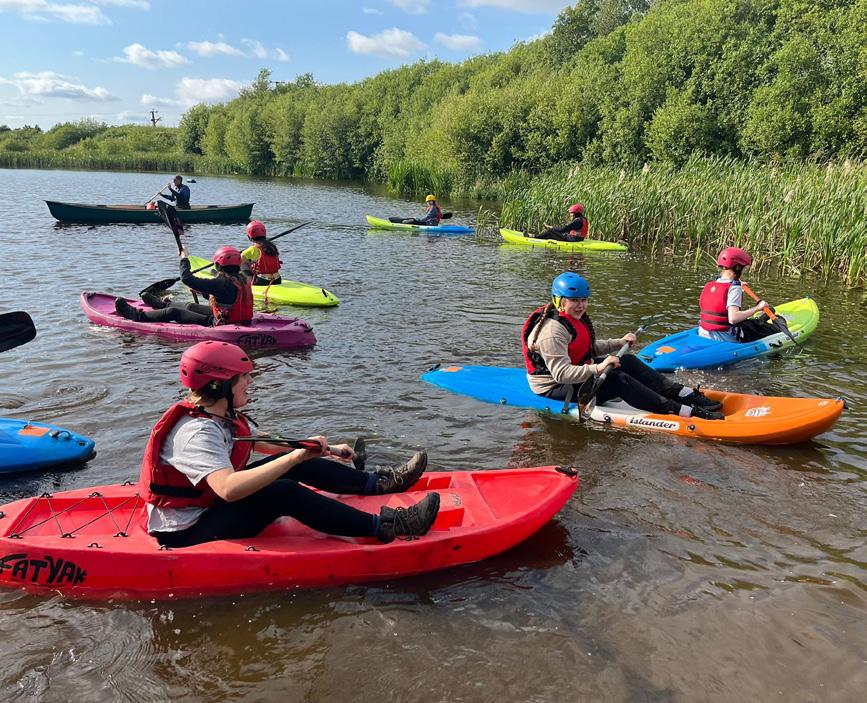


Ofsted The school has a strong programme that promotes pupils’ wider development.

Learning & Teaching
We believe that in order to deliver the very best learning to our pupils, our teachers need to be informed by the latest research into all aspects of pedagogy. This research forms a key element of our continued professional development for all staff and they are encouraged to trial new teaching methods and receive support and guidance from experienced colleagues in school. Every day is a school day, for everyone.
Digital Ambassador Programme
We are also invested in making sure our staff use new technologies to support and enhance the best teaching and learning. That’s why here at Penwortham Priory Academy, we
currently run a Digital Ambassador Programme for teachers. This ensures that staff are kept at the forefront of the digital transformation that is taking place in schools and businesses to allow for the very best enhancement of the teaching and learning that we provide at Penwortham Priory Academy.
Whether it be in the classroom or at home, the technology now available to us can be explored by staff and students in many ways to ensure we stay connected, learn more effectively and have the opportunity to become skilled practitioners ready for the 21st Century.
In time, it is envisaged that a Pupil Digital Ambassador Programme will run to ensure all students use technology to enhance their learning potential and leave Penwortham Priory Academy with the currency needed for a rapidly changing digital world.
Uniform
◆ Black full-length straight leg trousers (either flatfronted or single pleat)
◆ Knee length pleated black skirt with school badge
◆ Black blazer with badged pocket
◆ Optional black ‘V’ necked jumper with school badge
◆ Traditional stiff-collared white school shirt, long or short sleeve
◆ Sensible outdoor coat (no leather, denim, suede, tracksuit tops or hoodies)
◆ The school tie (worn by house colour) is only available direct from school, at a cost of £6
◆ Sensible plain black flat shoes – NO TRAINERS/ NO BOOTS
◆ Socks – plain grey or black with trousers, plain white knee length socks with skirt or opaque black tights
◆ Hijabs (head scarves), if worn, must be black
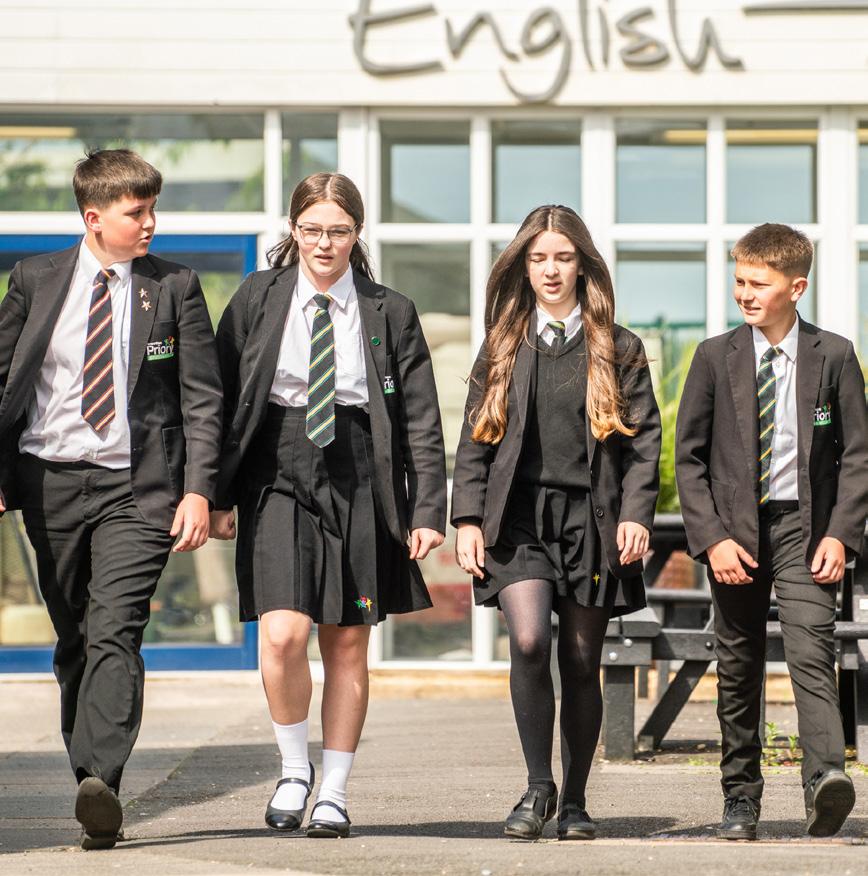
PE Kit
◆ Navy shorts with school badge
◆ Navy short-sleeved crew neck shirt with school badge or white polo shirt with school badge
◆ Navy games socks with white tops showing school name for outdoor activities
◆ White crew sports socks for indoor and summer activities
◆ Navy 1/4 zip or navy full zip training top with school badge
◆ Non-marking sports trainers
◆ Towel
◆ Gum shields (strongly recommended for hockey and rugby)
◆ Shin pads (compulsory for football and strongly recommended for hockey and rugby)
◆ Hair bobble for hair that impedes vision
◆ Optional tracksuit pants/leggings with school badge

The school will be the final arbiter regarding suitability of dress and appearance.
Health and Welfare

Confidentiality
It is occasionally necessary for pupils to speak confidentially to members of staff. Teachers always encourage pupils to discuss such issues with their parents and at all times use their professional judgement in dealing with sensitive or difficult issues.
Attendance
Attendance throughout the term is compulsory. The only valid reason for absence is the pupil’s own illness and, in such cases, the school should be informed as soon as possible by telephone (choose option 1 and leave a message if no one is available), email or letter. On the first day of an unnotified absence, the school will make contact with parents by telephone or text.
Holidays During Term Time
Instruction from the Department of Education makes it very unlikely that permission for family holidays/leave of absence will be granted except in the most exceptional of circumstances. In determining whether an absence request is exceptional, we will follow national guidelines and, in particular, will take note of the following:
Holidays/leave requests which are taken for the following reasons will not be authorised:
◆ Availability of cheap holidays
◆ Parental/family working arrangements
◆ Poor weather experienced in school holiday periods
◆ Overlap with the beginning or end of term
◆ Family celebrations
In line with the above procedures, any such absence will be recorded as unauthorised and may result in a fine.
Medical Appointments During School Hours
Wherever possible, appointments should be made outside of school hours. Parents should ring the attendance line (choose option 1 and leave a message if no one is available) providing details of the appointment, or alternatively send the pupil with a note/appointment card to the pastoral office. The pastoral office will provide the pupil with a permission slip which they should take to the school office when they need to sign out before leaving the school site.
School Health Service
The school nurse makes regular visits to the school and individual appointments can be made by parents via the SEN Co-ordinator.
School Counsellor Service
The school utilises the services of counsellor, Charlotte Lowe and her team. Charlotte is extremely experienced in working within the mental health sector, both with adults, as well as children and young people, and individual appointments can be made for pupils to work with Charlotte as necessary.
Medicines
The school office will only store inhalers, epi pens and diabetic supplies for emergency use, as back up.
Illness and Accidents in School
When a child feels ill in school, they must first report to their class teacher. The teacher will contact the pastoral team who will decide if the pupil should be sent home and if so, contact the pupil’s parents. Pupils are not authorised to make their own way home.
Minor accidents will be dealt with by the school office. In an emergency, the child is dispatched to hospital and the parent
Pupils are prepared well for future challenges.
Ofsted

asked to go there directly. It is essential, therefore, that the school has more than one contact name and number for your child and that any changes to contact details, including address, are advised as soon as they occur. It is absolutely essential that school has an emergency contact telephone number for every child.
Equipment
The school provides exercise books and text books but each child should be equipped with two pens (blue or black), one green pen, two pencils, a scientific calculator, a 30cm ruler, a rubber, sharpener and coloured pencils. All pupils have a locker, so we recommend a complete spare set of this equipment is kept in there too, should it be needed. Pupils will quickly find that they accumulate a large number of textbooks and will need a suitable sturdy bag to carry them in which should be water resistant. PE kit must never be carried in the same bag as books and classroom equipment. Pupils are responsible for the books and equipment entrusted to their care which, if lost or damaged through neglect, will have to be replaced at the pupil’s own expense.
Buses
Lancashire County Council currently runs bus services to school. Further information can be obtained from their website or direct from school. We also operate our own bus service using a commercial bus company. This service is reviewed annually dependent on pupil locations. Further information can be obtained direct from school and via our website.
The embarkation / disembarkation of buses is carefully supervised by staff and we expect pupils to act responsibly while travelling on the school buses. Anti-social behaviour on the buses will be severely dealt with.
Cycles
Parents must ensure that cycles are in roadworthy condition. Cycles may not be used at any time during the school day without
permission of a member of staff. Cycle storage is provided but pupils are advised to lock their cycles and remove pumps and clip-on lamps. During the winter months (October - March) it is recommended that all cyclists wear a luminous cycle belt and shoulder strap.
All cyclists are required to wear a helmet, failure to adhere to this rule will result in pupils being stopped from cycling to school. We advise parents to take out their own insurance policy with respect to cycles on school premises as the school does not insure cycles.
Valuables
Wherever possible, pupils should avoid bringing valuables into school. Money should never be left in coats or bags which are left in cloakroom areas, form rooms or classrooms. The school has a mobile phone policy which is available to all parents. The school holds no responsibility for the loss of such items.
Use of a locker is compulsory for the storage of coats, PE kit, a spare pencil case with equipment for lessons and packed lunch, if necessary, while pupils are in school. Lockers cost £5 for the full five years.
Lost Property
In general, property lost or found is located in the Pastoral Office, though PE kit is kept by the PE Department. The importance of marking all property with the owner’s name cannot be stressed too strongly. School will retain lost property until the end of each half term before disposal.
Charging Policy
The Trustees reserve their rights under the Education Reform Act to invite parents to make voluntary contributions for certain activities that are deemed essential.
However, no pupil will be excluded from the activity if their parents are unable to make such a contribution.
Teaching Staff
Mr Matthew Eastham, BSc (Joint Hons) – PE, Sports Science & Geography, MA in Educational Leadership & Management, PGCE, National Professional Qualification in Executive Leadership (NPQEL)
Mrs Donna Crank, BSc (Combined Hons) – Business, Management & ICT, PGCE – Education
Mr Neil Gee, BSc (Hons) – Sports Science, PGCE – Physical Education
Miss Kate Thornton, BA (Hons) – English Language, Literature & Writing Studies, MA in Renaissance & Romantic Literature, PGCE
Mrs Andrea Bailey, BA (Joint Hons) – French & Management, PGCE –Secondary Education Modern Foreign Languages
Mr David Bedford, BSc (Hons) – Forensic Sciences, MA in Teaching & Learning, PGCE
Miss Alison Beesley, BSc (Hons) – Sport & Exercise, GTP
Ms Stephanie Beswick, BA (Hons) Journalism, PGCE
Miss Rachel Burbridge, BA (Hons) - English Language, PGCE
Mrs Sharlan Butcher, BSc (Hons) Biomedical Sciences, PGCE
Mr Mark Bullock, BSc (Hons) – Sport & Exercise Science, PGCE
Mrs Rachel Bullock, BA (Hons) – Sports Studies, PGCE
Mrs Megan Cauchi, BA (Hons) – History, MA – History, PGCE – History
Mrs Victoria Eastham, BSc (Hons) – Human Physiology, PGCE
Mr Alastair Eccles, BA (Hons) – History, PGCE
Mrs Jill Elliott, BA (Hons) – Business Studies, DipHE – English, PGCE
Mr Gareth Evans, BA (Hons) – Mathematics in Secondary Education
Miss Grace Gregson, BSc (Hons) – Computing, PGCE
Mrs Kerry Ham, BSc (Hons) – Psychology & Criminology, PGCE
Mrs Amanda Holland, BTheology (Hons) (Oxon), MA in Inclusion & Special Educational Needs, PGCE – RE & PSHE
Miss Felicity Howell, BA (Hons) – Musical Theatre, PGCE
Mr Andrew Hunter, BA (Joint Hons) – Education & Mathematics, PGCE –Secondary Mathematics
Mr Peter Kenrick, BSc (Hons) – Money, Banking & Finance, PGCE - Mathematics
Mrs Laura Kursitis, BA – Geography, PGCE – Secondary Education
Mrs Sarah Lawe, BA (Hons) – Game Design & Development, PGCE
Mrs Emma Lockwood, BA (Hons) – Fashion with Manufacturing, Marketing & Promotion, PGCE
Mrs Catriona Massey, BSc (Hons) – Sport & Exercise, PGCE – Secondary Science
Mr Peter Metcalfe, BSc (Hons) – Geography, PGCE
Mr Irfaan Momoniat, BA (Hons) – Geography, PGCE
Mr Ryan Owen, BA – Politics & Parliamentary Studies, QTS
Mrs Amanda Potter, Mchem (Hons) Chemistry, PGCE – Science
Mrs Salma Qadri, BSc (Hons) – Combined Technology (Computer Science & Mathematics), PGCE
Mr Tim Raynor, BSc (Joint Hons) – Maths & PE, PGCE – Secondary in Maths
Mrs Kirsty Roberts, BSc – Science, PGCE - Science
Mrs Ellie Robinson, BA(Hons) – English Literature, Creative Writing & Practice, PGCE
Mrs Amanda Scully, BA (Hons) – French & Sport Science, PGCE
Mrs Louise Shaw, BA (Hons) – 3D Design (Interior Design), GTP
Ms Tracey Smith, BA (Hons) – Surface Pattern Design, PGCE
Mr Arran Sneddon, BSc (Hons) – Economics, PGCE – Mathematics
Mr Alexis Taylor, BMus (Hons), PGCE
Mr Andrew Watters, BA (Hons) – Geography, History & Politics, PGCE
Mrs Laura Webster, BA – English & Education with QTS
Principal
Assistant Principal
Assistant Principal
Assistant Principal
Head of Year 9/Modern Foreign Languages
Head of Science/Lead Teacher of Chemistry
PE
Head of English
English Science
Head of PE & School Sport/SLT Intern
Head of Year 8/PE
Humanities/D of E/House Leader (Douglas)
Head of Year 11/Science
Humanities/Lead Teacher of History
English/Lead Librarian
Maths/Lead Practitioner in Teaching and Learning ICT
Head of Year 10/Humanities/Lead Teacher of RE
Lead Practitioner Improving Inclusion for Learners with SEND
Lead Teacher in Drama
Mathematics
Head of Mathematics
Humanities
Head of Design Technology
Technology
Science/Lead Teacher of Biology/House Leader (Calder)
Head of Humanities/Lead Practitioner Digital Transformation
Humanities
English/House Leader (Hodder)
Assistant Lead in Science/Lead Teacher of Physics
Head of ICT & Computer Science
Mathematics/House Leader (Ribble) Science
English
Head of Modern Foreign Languages
Technology/Art & Design
Lead Practitioner for Personal Development/ Careers Advisor
Assistant Lead in Mathematics
Lead Teacher of Music/Professional Mentor/MFL
Supply Teacher
English
Support Staff
Mrs Cheryl Barker, DipHE, CSBM, Level 7 SFOL Diploma, Cert FRA
Mr Keith Bolton, FdSc
Mrs Sue Spencer
Mrs Janet Ali
Miss Jennifer Atkinson, BA (Hons) Film Studies and History
Mr Tim Bamber
Mrs Kirsten Billings
Miss Gaby Conway, BA (Hons) – Jewellery & Silversmithing
Miss Susan Conway
Mrs Jennifer Cookson, BSc (Hons) – Product Design & Technology, CSBM
Mrs Jane Crix-Jopson, BSc (Hons) – Media Production and Technology
Miss Lucy Courtney-Brindle
Mrs Elle Diamond-Bugler, CSBM
Mrs Sarah Dixon, BA (Hons) – English Literature
Mrs Sarah Eastham, BA (Hons) – Spanish & Drama, PGCE
Mr Frank Eccles
Mrs Emma Evans, BA (Hons)
– Theatre Design & Technology
Mr John Evans
Mrs Laura Farley, BSc (Hons) – Sport & Exercise, PGCE
Mr Chris Farron
Mr Pete Faulkner, Bed (Hons) – English Studies, MEd, NPQH
Strategic Business Development Manager
Strategic Estates Development Manager (Premises & ICT)
Academy Manager/PA to Principal/ Clerk to Trustees
Learning Support Assistant
Learning Support Assistant
Estates Team
Catering Manager
Exams and Pupil Data Officer
Attendance & Pastoral Support Officer
Assistant Business ManagerFinance & HR
Receptionist & Administration Support
Learning Support Assistant
Assistant Business Manager –Business Services
Learning Support Assistant
Learning Support Assistant
ICT Senior Technician
Receptionist & Administration Support
Science Technician
Head of Year 7/Transition Manager/ Primary Schools Co-ordinator
Estates Team – Lead Gardener
Pastoral Manager
Trustees
Trustees appointed by the Members
Dr Phil Range - Chair of Trustees
Miss Jemma Oliver - Vice Chair of Trustees
Mrs Rachel Lancaster
Mrs Florica Patel
Mr Owen Hughes
Mrs Susan Brown
Miss Michaela Hardman
Miss Sarah Haydock
Mrs Gill Holt
Mrs Zakirah Karodia
Mr Andrew Kolacz
Mrs Sarah Kolacz
Mrs Veronica Little
Mrs Charlotte Lowe
Miss Danielle Morley
Mrs Jan Nayler, M.Ed, PGCert, CertEd
Mr Dominic Oakes
Mr Liam O’Connor
Mr Ian Parkinson
Mrs Gemma Patterson
Mr Simon Preston
Mr Graeme Shipton, BSc (Hons)
– Sports Science
Mrs Janice Simpson
Miss Lucy Snape
Mrs Mihaela Stavila
Mrs Doreen Swire, HLTA, Fd in
Teaching & Learning
Mr Ian Tiffin
Miss Emily Whaite
Mrs Fiona Whalley
Mrs Alex Willis
Mr Chris Wilkinson
Mr Mark Wynter
Mrs Janet Yates
Parent Trustees
Ms Gillian Hayhurst
Vacant position
Co-opted Trustees
Mr Pete Faulkner
Mrs Elle Diamond-Bugler
Rev Kevin Jones
Miss Chrissie Church
Catering Assistant
Office & Business Support Supervisor
Receptionist & Administration Support
Cover Supervisor
Estates Team
Learning Support Assistant
Administration Support & Reprographics
Counsellor
Catering Manager
Learning Support Manager
ICT Technician
ICT Technician
Technology Technician
Catering Assistant
Catering Assistant
Pastoral Manager
Learning Support Assistant
Catering Assistant
Catering Assistant
Attendance & Family Support Manager
Estates Team
Learning Support Assistant
Learning Support Assistant
Family Support Manager
Assistant Estates Operational Manager
Lettings Supervisor
Communications & Marketing Manager/Alumni Liaison
Principal Mr Matt Eastham
School Holiday Pattern 2025/2026
INSET DAY 1
School re-opens to pupils
Learning for Life Day 1
INSET DAY 2
Mid Term Closure
Learning for Life Day 2
Early lunch followed by School closure at 1:20pm on
INSET DAY 3
Number of openings - 72
School re-opens on
Learning for Life Day 3
Mid Term Closure
Early lunch followed by School closure at 1:20pm on
Number of openings - 55
School re-opens on
Learning for Life Day 4
May Day Closure
INSET DAY 4
Mid Term Closure
Learning for Life Day 5
Early lunch followed by School closure at 1:20pm on
INSET DAY 5
Number of openings - 63
Total number of openings - 190
Monday 1 September 2025
Tuesday 2 September 2025
Monday 22 September 2025 (early lunch and school closure at 1.20pm)
Tuesday 23 September 2025
Open Evening
Monday 27 October - Friday 31 October 2025 (inclusive)
Monday 24 November 2025 (early lunch and school closure at 1.20pm)
Thursday 18 December 2025
Friday 19 December 2025
Monday 5 January 2026
Friday 30 January 2026
(early lunch and school closure at 1.20pm)
Monday 16 February - Friday 20 February 2026 (inclusive)
Friday 27 March 2026
Monday 13 April 2026
Tuesday 28 April 2026
(early lunch and school closure at 1.20pm)
Monday 4 May 2026
Tuesday 5 May 2026
Monday 25 May - Friday 29 May 2026 (inclusive)
Thursday 18 June 2026
(early lunch and school closure at 1.20pm)
Friday 17 July 2026
Monday 20 July 2026
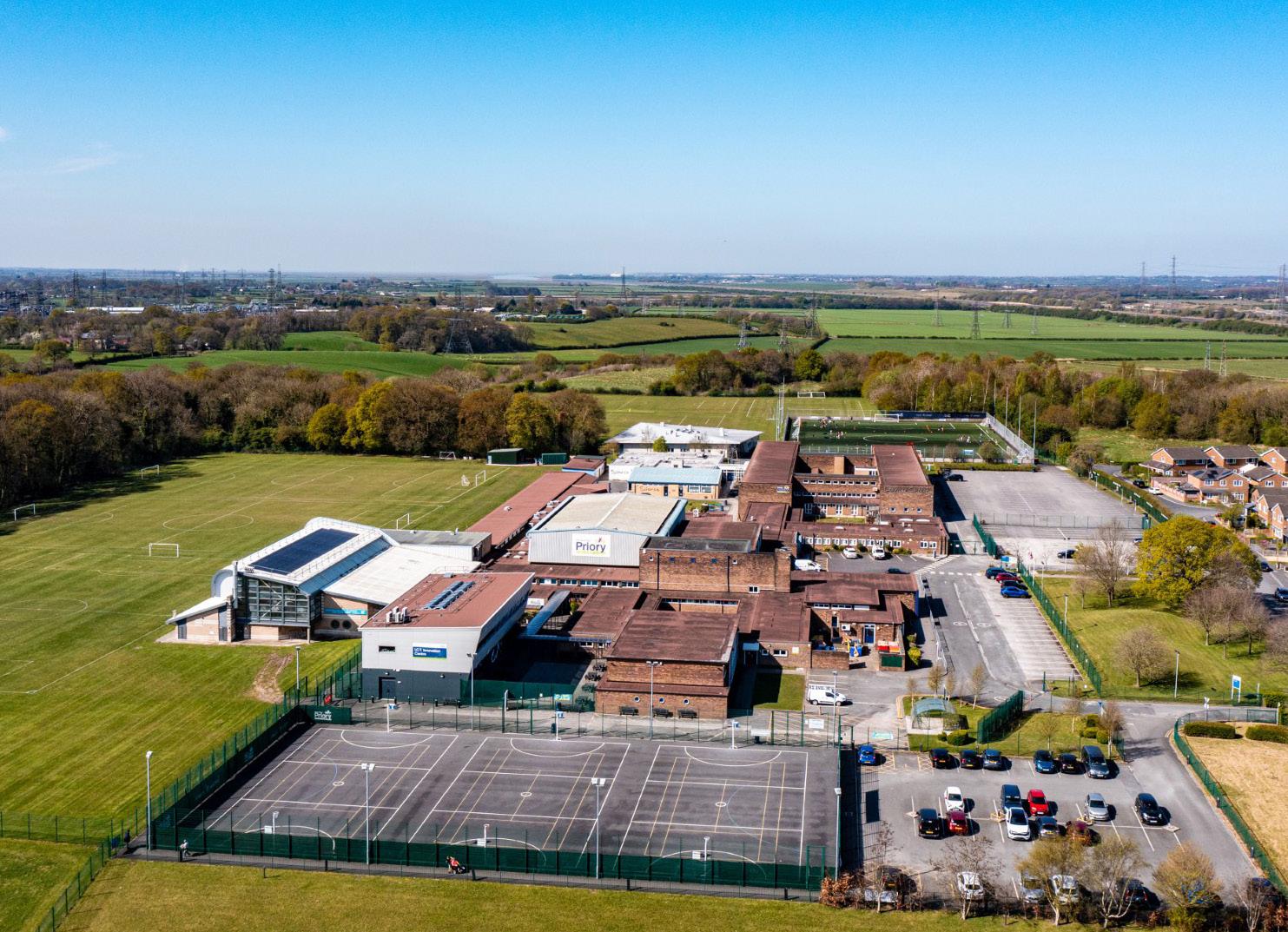
To all Priory staff past and present,
It seems barely five minutes, let alone five years since I visited Priory with my daughter, and we jointly selected it as the school she would attend. I remember the hopes and the fears of where those five years might lead and what might be their outcome. The five years are ending with hopes realised and fears dispelled.
I’d like to give a big thank you to all of the Priory staff, past and present for all of their work, kindness and support over the past five years. My daughter has had a wonderful time at school and although she will of course miss all of the friends she has made, she is now fully ready for the adventures that lay ahead.
For me the purpose of school is to play its part in creating fully formed and rounded people who can play an active role in all of the aspects required to be a fully engaged, caring and contributing member of society.
In addition to the academic pursuits then, my daughter has joyfully taken advantage of the wide range of sporting and extra-curricular activities offered by the school, and these have played a crucial part in her development and preparing her, not just for work, but for life. She has also benefited from the safe and supportive environment created amongst the student community at the school and the circle of friends she has been part of.
I know a little of the external pressures that schools and their staff come under and would like to offer my thanks and congratulations for a job very well done, and my hope that despite these external pressures, your good work will continue to provide children with a platform from which they can embark on fulfilling lives.
I think you can feel proud of what you have jointly achieved.
Parent of a Year 11 pupil



